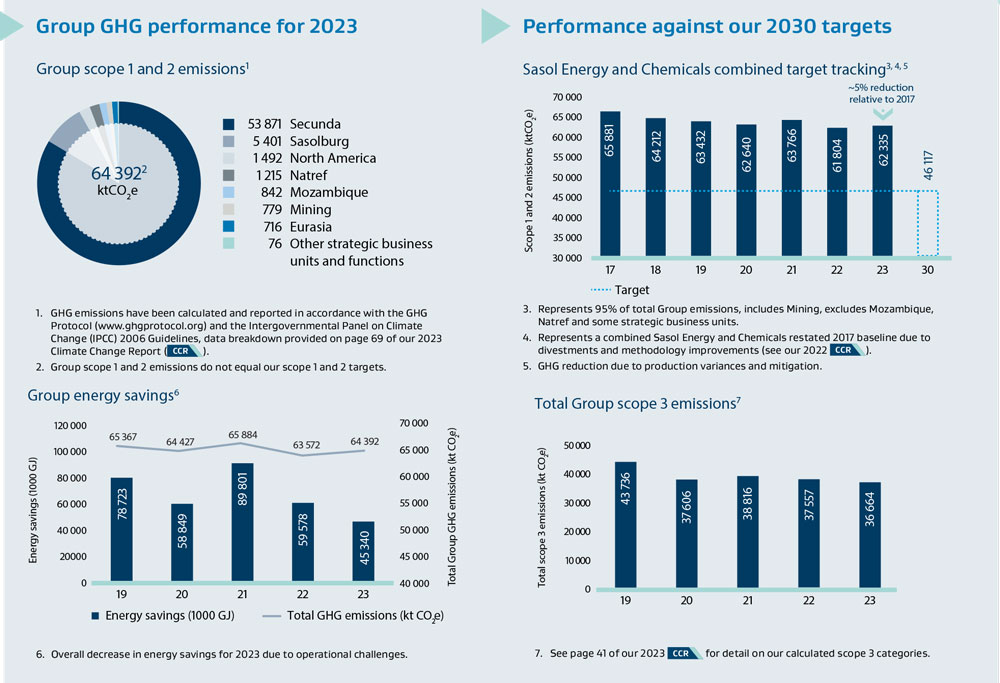- Home
-
Who We Are

Overview
Sasol is a global chemicals and energy company. We harness our knowledge and expertise to integrate sophisticated technologies and processes into world-scale operating facilities. We safely and sustainably source, produce and market a range of high-quality products, creating value for stakeholders.
-
Our Businesses

Overview
Sasol comprises three distinct market-focused businesses, namely: Chemicals, Energy and Sasol ecoFT. Our more focused portfolio is underpinned by a transition to a lower-carbon future and our 70-year track record demonstrates we have the capabilities and competencies to deliver sustainable value in these three core businesses.
-
ESG

Overview
Advancing chemical and energy solutions that contribute to a thriving planet, society and enterprise.
-
Investor Centre

Overview
Sasol's investors consist of both equity investors (those invested in the Sasol ordinary shares or the ADRs) and lenders/debt investors (banks and institutional investors lending to Sasol or investing in its issues of debt instruments such as local bonds, offshore bonds, commercial paper issues, project finance, loans and other credit facilities and convertible instruments).
-
Suppliers
- North America
- Sasol Supplier Landscape and Guiding Principles
- Supplier Environment, Social and Governance (ESG)
- Become A Supplier
- Service Provider Safety Management
- Enterprise And Supplier Development
- Existing Supplier Portal
- Contract Terms And Conditions
- Important Links
- Supply Chain Fraud Alert
- Sasol EthicsLine

Overview
Supply Chain is the custodian of all external spend for the Sasol Group. It is responsible for managing supply and demand so as to ensure cost-efficiency and maximise return on spend, while at the same time ensuring effective logistics of a range of deliverables.
-
Careers

Overview
Explore existing opportunities to energise your career to the next level. Whether you are seeking a Learnership or you are Student or Graduate or Experienced Hire. Find out how you can add value to the Sasol Team.
-
Media Centre

Overview
Access media releases and view latest social media updates
- Contact Us
Our climate change position
Our climate change position

Our climate change position
Our climate change position
Our climate change position is that we:
- support the Paris Agreement and contribute to SDG 13;
- accept the mainstream climate science assessed by the IPCC for net zero carbon dioxide emissions to be reached by 2050;
- acknowledge that business has a role to play in managing the risks of climate change, as well as realising opportunities in the transition to unlock societal value;
- recognise the importance of enabling a just and equitable transition that is appropriately paced and timed for the context within which we operate; and
- recognise the importance of adaptation and resilience in a changing climate.
In line with this position, we are on a path to progressively reduce our emissions and improve performance towards a net zero ambition by 2050.

Transparent climate change disclosures
- Sasol submitted its mandatory GHG reporting submission in March this year, which was approved by the South African Department of Forestry Fisheries and the Environment (DFFE).
- Sasol submitted its annual Pollution Prevention Plan (PPP) progress report, which was approved by the DFFE.
- Sasol was issued with a preliminary voluntary carbon budget of ~280 MtCO2e by the DFFE which is under review.
- Sasol’s net South African carbon tax liability for 2023 on calendar year 2022’s GHG emissions, after carbon offsets and electricity levies, was R1,138 billion.
2023 Emission reductions
In 2023, we achieved an approximate 5% reduction off the combined Sasol Energy and Chemicals 2017 scope 1 and 2 baseline through ongoing mitigation interventions, equating to an approximate 3,5 MtCO2e reduction.
- Higher production rates, as well as process inefficiencies, external power interruptions and shortage of natural gas contributed to marginally higher year-on-year emissions, eroding emission reductions relative to 2022. Product volumes were however lower relative to 2017.
- Maintained energy-efficiency projects and introduced additional measures.
- Nitrous oxide abatement projects delivered some reductions, albeit not to full potential.
- Achieved an approximate 13,4% energy efficiency saving from 2005, which was lower than expected, as a result of external power disruptions, poor coal quality and a shortage of natural gas. Significant decreases in scope 3 Category 11 emissions, mostly due to lower production of liquid fuels, which is reflected in our overall scope 3 inventory.
Overall, we continue to progress our emission-reduction roadmaps towards achieving a 30% GHG reduction by 2030 despite a challenging economic environment.

